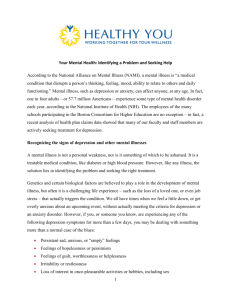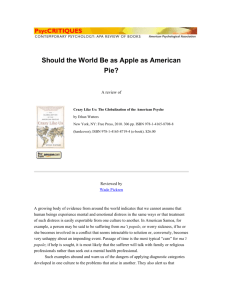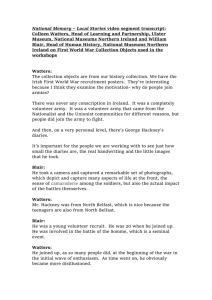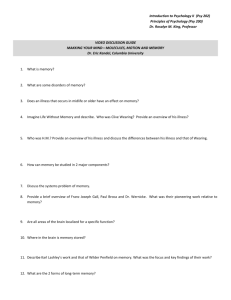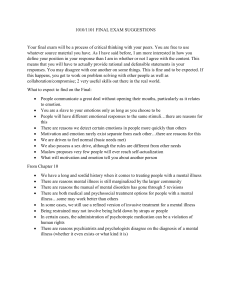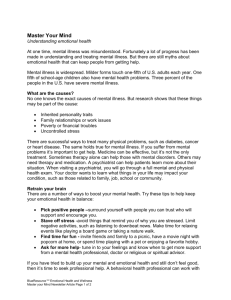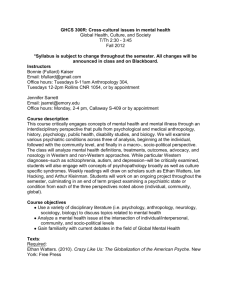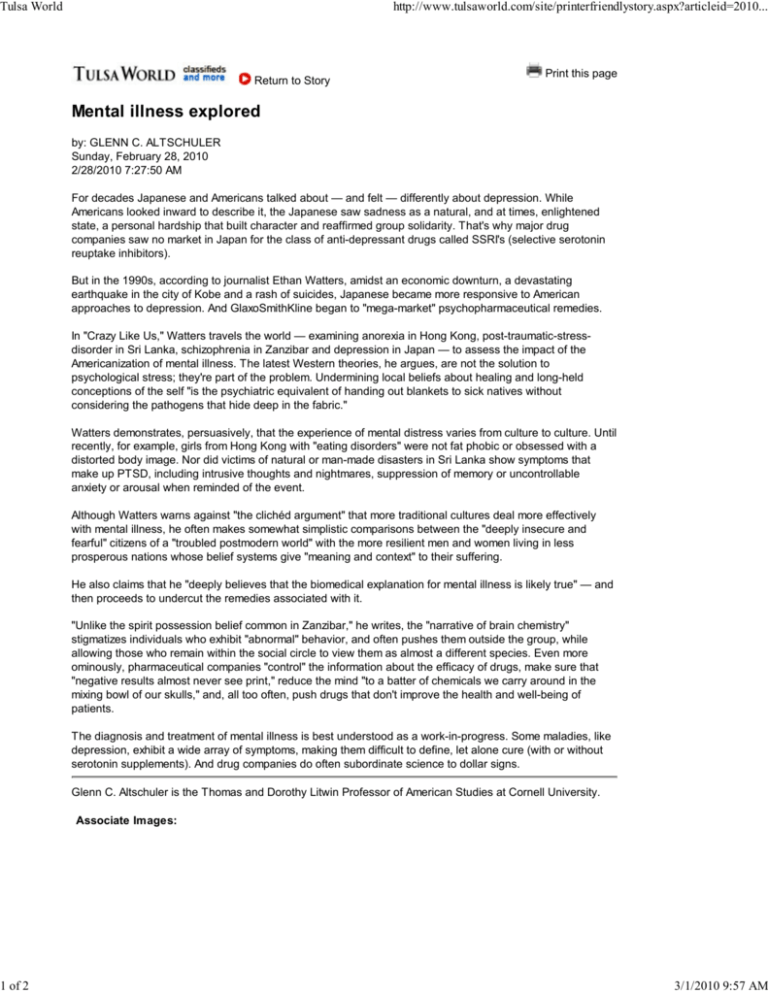
Tulsa World
1 of 2
http://www.tulsaworld.com/site/printerfriendlystory.aspx?articleid=2010...
Return to Story
Print this page
Mental illness explored
by: GLENN C. ALTSCHULER
Sunday, February 28, 2010
2/28/2010 7:27:50 AM
For decades Japanese and Americans talked about — and felt — differently about depression. While
Americans looked inward to describe it, the Japanese saw sadness as a natural, and at times, enlightened
state, a personal hardship that built character and reaffirmed group solidarity. That's why major drug
companies saw no market in Japan for the class of anti-depressant drugs called SSRI's (selective serotonin
reuptake inhibitors).
But in the 1990s, according to journalist Ethan Watters, amidst an economic downturn, a devastating
earthquake in the city of Kobe and a rash of suicides, Japanese became more responsive to American
approaches to depression. And GlaxoSmithKline began to "mega-market" psychopharmaceutical remedies.
In "Crazy Like Us," Watters travels the world — examining anorexia in Hong Kong, post-traumatic-stressdisorder in Sri Lanka, schizophrenia in Zanzibar and depression in Japan — to assess the impact of the
Americanization of mental illness. The latest Western theories, he argues, are not the solution to
psychological stress; they're part of the problem. Undermining local beliefs about healing and long-held
conceptions of the self "is the psychiatric equivalent of handing out blankets to sick natives without
considering the pathogens that hide deep in the fabric."
Watters demonstrates, persuasively, that the experience of mental distress varies from culture to culture. Until
recently, for example, girls from Hong Kong with "eating disorders" were not fat phobic or obsessed with a
distorted body image. Nor did victims of natural or man-made disasters in Sri Lanka show symptoms that
make up PTSD, including intrusive thoughts and nightmares, suppression of memory or uncontrollable
anxiety or arousal when reminded of the event.
Although Watters warns against "the clichéd argument" that more traditional cultures deal more effectively
with mental illness, he often makes somewhat simplistic comparisons between the "deeply insecure and
fearful" citizens of a "troubled postmodern world" with the more resilient men and women living in less
prosperous nations whose belief systems give "meaning and context" to their suffering.
He also claims that he "deeply believes that the biomedical explanation for mental illness is likely true" — and
then proceeds to undercut the remedies associated with it.
"Unlike the spirit possession belief common in Zanzibar," he writes, the "narrative of brain chemistry"
stigmatizes individuals who exhibit "abnormal" behavior, and often pushes them outside the group, while
allowing those who remain within the social circle to view them as almost a different species. Even more
ominously, pharmaceutical companies "control" the information about the efficacy of drugs, make sure that
"negative results almost never see print," reduce the mind "to a batter of chemicals we carry around in the
mixing bowl of our skulls," and, all too often, push drugs that don't improve the health and well-being of
patients.
The diagnosis and treatment of mental illness is best understood as a work-in-progress. Some maladies, like
depression, exhibit a wide array of symptoms, making them difficult to define, let alone cure (with or without
serotonin supplements). And drug companies do often subordinate science to dollar signs.
Glenn C. Altschuler is the Thomas and Dorothy Litwin Professor of American Studies at Cornell University.
Associate Images:
3/1/2010 9:57 AM
Tulsa World
2 of 2
http://www.tulsaworld.com/site/printerfriendlystory.aspx?articleid=2010...
Crazy like us
The Globalization of the American Psyche
Ethan Watters
Free Press, $26
Copyright © 2010, World Publishing Co. All rights reserved
Return to Story
3/1/2010 9:57 AM


